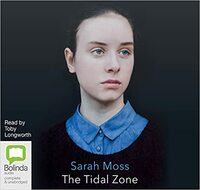You need to sign in or sign up before continuing.
Take a photo of a barcode or cover
Si la portada ya es bonita, el interior la supera con creces. Algunas cosas sobran, pero en general es una novela preciosa. Leedlo, simplemente leedlo.
emotional
reflective
slow-paced
Plot or Character Driven:
Character
Strong character development:
Yes
Loveable characters:
Yes
Diverse cast of characters:
No
Flaws of characters a main focus:
Complicated
Moderate: Medical trauma
Minor: Sexism
I feel wordless after reading this book. Incredible and heartbreaking, beautiful and haunting. I really want to write something as good as this book; it is possibly one of the most beautifully written books I have ever read. Sarah Moss discusses the fear of death, the ups and downs of marriage and parenthood, and all in all, the life in general in such detail. I felt so invested with the story and the narrator, and I would have liked to read it slowly but I couldn't stop reading every time I picked up the book. This will be one of my favourite books of this year, I am sure. Buy it and read it.
hopeful
inspiring
reflective
slow-paced
Plot or Character Driven:
A mix
Strong character development:
Yes
Loveable characters:
Yes
Diverse cast of characters:
No
My second time reading it and I'm upping the star rating, I'm amazed how this captures me, I've been in hospital with a child and so lots of this rang true for me but also it manages to get me looking up pictures of Coventry cathedral. I love the way she ties strands together, the grandfather, the family and the cathedral, just brilliant.
DNF at page 200 (59%). Dreadfully boring story that went nowhere. It was a chore to keep forcing myself to read it. Too many great books out there to plod through this one. Great cover art, though!
Let me start by saying Sarah Moss is quite the writer. She's a master over her words and pulls out exquisite turns of phrase that make me want to fold a corner or scrawl something down every few pages. In this book - the first fiction I've read by her, although I loved her account of living in Iceland, Names for the Sea - Adam, a stay-at-home dad, is one day confronted suddenly, sickeningly by the closeness of death when he receives a call from his daughter's school. There's been an incident. Miriam, aged 14, has had a mysterious anaphylactic reaction and gone into cardiac arrest. This brings the fragility of life into sharper focus than anything ever has before - including his academic work on the bombing of Coventry during the WW2. Suddenly everything he knows, loves and does - rock-pooling, running, his study of the rebuilding of Coventry cathedral (which I would LOVE to see after reading this) - takes on a new perspective. There are as many big ideas - life, loss, memory, legacy - in here as there are mundane domestic details and frustrations, and Moss articulates both equally well.
A few points of irritation, though. Lots of readers have commented on how well-drawn the characters are. I agree that mainly they ARE well done, but Miriam's character was perhaps the least credible (after 12 years of teaching clever 14 year old girls I feel I can say that) and that some of the dialogue prompted incredulity akin to that which Dawson's Creek (remember that? Lots of big words and 'deepness') used to induce in me. Too liberal, too feminist, too eco-warrior, too smug - in short, too smart and too unrealistic. Also, what was with all of the cooking? Adam's obsession with middle-class food preparation (French toast, bloody chickpeas everywhere) cropped up in practically every chapter and felt really heavy-handed - or did I miss something? Was there a reason for it? Did the plot hinge on the fact that we needed to be reminded at every possible opportunity of Adam's fear of refined sugar and cheap carbohydrates?
Anyway. Read it. Read anything by her. She's super-talented.
A few points of irritation, though. Lots of readers have commented on how well-drawn the characters are. I agree that mainly they ARE well done, but Miriam's character was perhaps the least credible (after 12 years of teaching clever 14 year old girls I feel I can say that) and that some of the dialogue prompted incredulity akin to that which Dawson's Creek (remember that? Lots of big words and 'deepness') used to induce in me. Too liberal, too feminist, too eco-warrior, too smug - in short, too smart and too unrealistic. Also, what was with all of the cooking? Adam's obsession with middle-class food preparation (French toast, bloody chickpeas everywhere) cropped up in practically every chapter and felt really heavy-handed - or did I miss something? Was there a reason for it? Did the plot hinge on the fact that we needed to be reminded at every possible opportunity of Adam's fear of refined sugar and cheap carbohydrates?
Anyway. Read it. Read anything by her. She's super-talented.
a little tedious & hard to warm up to for the first 100 pages (although the prose and imagery of the opening paragraphs are elegant and intriguing) & it probably didn't help that it fed into all my anxieties so I kept having to put it down like every 15 pages, but ultimately this was a solid novel. it's continued to stay with me, long after I've finished it.
The trope of the ordinary family facing a medical emergency which tries their relationships is the bones of a thousand TV soaps. Sarah Moss’s The Tidal Zone opens with such a medical emergence, a teenager’s unexpected anaphylaxis and cardiac arrest. It is an incident which would occupy five minutes’ attention on a hospital soap. Moss, however, eschews sensationalism. Instead she takes the incidence and its consequences and stretches out onto a broad, rich canvas, tracing the ripples it sends out through time and memory. She pulls the reader through the narrative with the hooks of so called “sick lit”, but avoids high-octane drama and a simplistic resolution. We are instead given an exquisite exploration of parental anxiety, dependence and human frailty.
The novel is written from the perspective of Adam Goldschmidt, a ‘househusband’ sporadically employed as a lecturer, whose daughter Miriam suddenly and inexplicable goes into cardiac arrest in a field at school. Adam’s voice is well realised, he is astute yet uncynical. For example, when he yearns for normality Moss captures both Adam’s extreme distress and self-awareness well, in “May we live long enough to despise the cliches again, may we heal enough to take for granted the sky and water and light, because the state of blind gratitude for breath and blood is not a position of intelligence.”Adam knows how his crisis pales in comparison to the endless global massacres that flicker by on the news. Crisis and emotional turmoil are written without sentimentality, but it is not dispassionate.We share in Adam’s anxiety which drives him to his children’s rooms at night to check they are still breathing, the novel is tense with foreboding and dread which Moss thankfully doesn’t give into releasing in a sensationalist conclusion.
Book Louse Review
The novel is written from the perspective of Adam Goldschmidt, a ‘househusband’ sporadically employed as a lecturer, whose daughter Miriam suddenly and inexplicable goes into cardiac arrest in a field at school. Adam’s voice is well realised, he is astute yet uncynical. For example, when he yearns for normality Moss captures both Adam’s extreme distress and self-awareness well, in “May we live long enough to despise the cliches again, may we heal enough to take for granted the sky and water and light, because the state of blind gratitude for breath and blood is not a position of intelligence.”Adam knows how his crisis pales in comparison to the endless global massacres that flicker by on the news. Crisis and emotional turmoil are written without sentimentality, but it is not dispassionate.We share in Adam’s anxiety which drives him to his children’s rooms at night to check they are still breathing, the novel is tense with foreboding and dread which Moss thankfully doesn’t give into releasing in a sensationalist conclusion.




